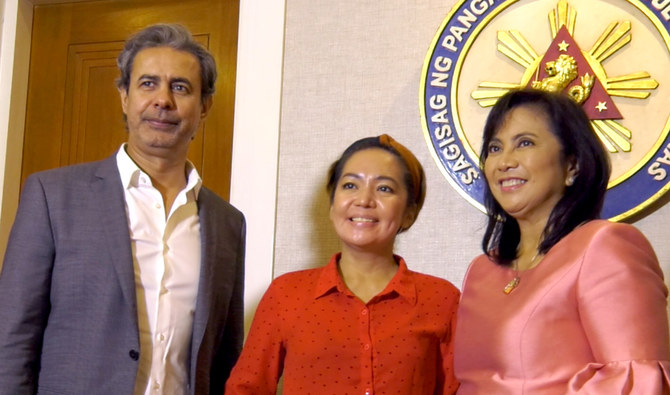MANILA: Before her husband died in a plane crash in 2012, Leni Robredo was resolved never to enter politics.
But tragedy catapulted the lawyer and mother of three onto the political stage and today, over three years since she took oath as the vice president of the Philippines, Robredo admits, even if begrudgingly, that she might be in politics for the long haul.
Before running for office in 2015, Robredo, 54, had earned a reputation as a lawyer who helped poor farmers and fishermen and for being a steadfast opponent of corruption.
She was elected separately to President Rodrigo Duterte and has always had a frosty relationship with the president, who routinely mocks her during public speeches.
Earlier this year, police charged members of the Philippine political opposition — including Robredo — with sedition and other offences for reportedly plotting to oust Duterte, charges she describes as harassment to intimidate critics of the increasingly autocratic leader.
The soft-spoken lawyer and former legislator has constantly questioned Duterte’s drug war, which has left more than 6,600 people dead in the last three years, according to police estimates.
Robredo has also supported a resolution by the UN Human Rights Council to carry out an independent investigation into extrajudicial killings being carried out by the Philippine police.
All this work, Robredo laments, has meant less time at home with her three daughters Jessica, Janine and Jillian, who have had to grapple with both the untimely death of their father and the fallout of the illustrious political career of their mother.
“When my husband was the politician, I was the one protecting my children from the ugliness of it all,” Robdero told Arab News in an exclusive interview last week.
“Three years into my work as vice president, they seem to have adjusted to the job, but of course, they are looking toward the end of my term where they can have me again. But it has been difficult.”
Most days, by the time Robredo’s work day is over, it is well past dinner time and disappointment sets in yet again at not having made it home in time.
“I have tried to make sure that I still have time for my daughters, but it has been difficult,” Robredo said.
“Nowadays, my desire is to be home as soon as I can, to eat dinner with my children.”
Widowed at the age of 47 when her youngest daughter was just 12, the lawyer spoke with pride at having been an ever-present mother, picking and dropping her kids to school, preparing their meals and helping with homework.
But when her husband, then Philippines’ interior secretary died in a tragic air crash, Robredo was faced with the difficult prospect of filling his shoes.
“I felt like he [Jesse Robredo] was gone before he could fulfil all his dreams for the country. And because I was the one being called upon to step into his shoes, I could not say no. My being here is my responsibility to my husband,” she added.
Robredo thus ran in the 2013 general election and was elected to the Philippine House of Representatives, a post she held until her inauguration as vice president in June 2016.
As a member of Congress, Robredo said, she spent four days a week in Manila and the rest doing constituency work in her home province of Camarines Sur.
Her tenure as vice president since has come with ever greater work responsibilities and even less time to be a mother.
“It was something that my daughters had to adjust to in the sense that they have always been used to my presence,” Robredo said. “I have tried every means to make sure that despite the business and my work, I still have time for them, but it has been difficult.”
Today, though Robredo said she still enjoys reading, cleaning and organizing her home, hobbies are not a luxury she can afford.
“I'm looking forward to the end of my term where I feel I would be able to do things that I loved doing before,” she said. These include, above all, sleeping in and having dinner at home with her children.
An alumna of the University of the Philippines Diliman, Robredo graduated with an economics degree in 1986 and a degree in law in 1992 from the University of Nueva Caceres in Naga.
She then began a long and illustrious career as a lawyer and social activist.
Even as a politician, social reform topped her agenda and she pushed for bills requiring officials to fully disclose their wealth and allowing citizens to participate in local policy making.
“I was practicing law for more than 10 years and was immersed in very poor communities all my life, because that was my work,” Robredo said.
“It was a perfect fit for me, but then the plane crash happened, and we had to adjust to all the things after that.”
Though her political career has meant time away from being a homemaker, Robredo says what motivates her is the “privilege” of influencing policy, particularly with regards to poor constituents.
“That is something that keeps me going,” she said quietly.
While Robredo still has three years of a six-year term to complete, whether she is considering the presidential race in 2022 is a question she is constantly asked.
The vice president won on an anti-poverty platform but has received below-majority popularity ratings in the first three years of her term, according to surveys from Social Weather Stations.
“It is difficult to say,” Robredo said when asked if she would run in 2022.
“I am so tempted still to say that I will not run for the presidency, but I won’t say it anymore.”





























